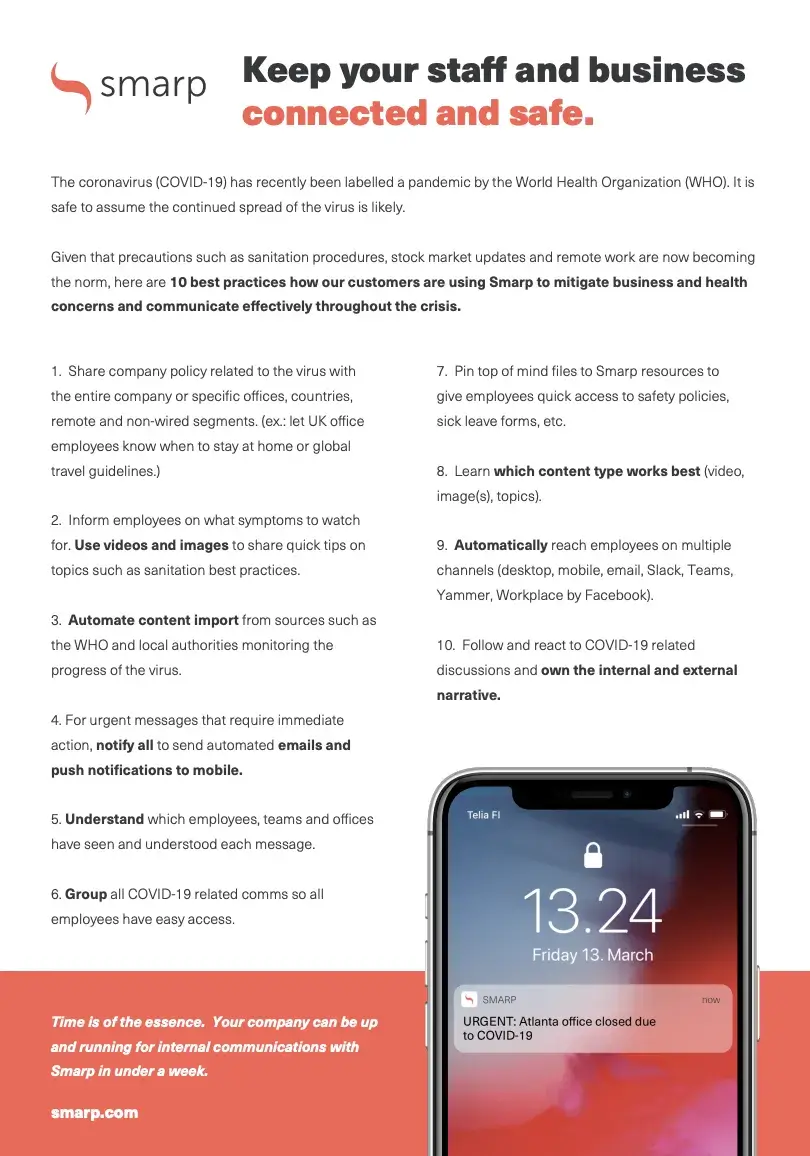As the coronavirus crisis unfolds globally, organizations across the world are now testing their crisis management readiness.
As coronavirus is affecting workplaces around the world, employers need to adjust to this new situation and develop a strategy to prevent damages coronavirus can bring. When we say damages, we mean both the safety and the productivity of your entire workforce.
This is especially true in large corporations with thousands of employees. Many of them have, by now, closed their offices and are trying to find alternatives for running the business as smoothly as possible.

In this blog, we will go over the importance of crisis communication in the workplace which goals are to keep employees safe, informed and productive during the COVID-19 crisis.
👀 Before we move forward, check out our article about Communication Strategy and 5 Steps to Get it Right
The Importance of Crisis Management During COVID-19
Crisis management is the process by which an organization deals with a disruptive and unexpected event that threatens to harm the organization or its stakeholders.
Failure to handle crisis properly can result in serious harm to stakeholders, losses for an organization, or even end its very existence.
Now, what is a crisis?
A crisis is defined as a significant threat to operations that can have negative consequences if it’s not handled properly. In most cases, crises can create three-related threats:
- public safety
- financial loss
- reputation loss
Coronavirus is most likely creating all these three threats a business can ever face. If crisis management is not handled properly or in a timely manner, you can put your employees’ health at risk.
This will automatically have a negative influence on your company’s reputation as both employer and a service or product provider. Consequently, it will be inevitable to experience financial losses.

Moreover, coronavirus came so fast that most organizations had no or very little time to set a strategy on how to handle it.
Therefore, the main goal for every crisis management and internal communications professionals these days is to make sure that all the employees are informed of the real COVID-19 situation and that they are not missing out on important information.
They also need to ensure that employees take responsibility by following advice from medical professionals and their employer and that the business continues to operate as smoothly as possible.
Remember, ensuring business continuity in crisis management mode requires the right mix of technology, strategy and agility.
Top Issues on Employees’ Minds During the COVID-19 Crisis
The Coronavirus is disrupting the workplace. Employees have to adapt to new ways of working in no time, business leaders have to find ways to ensure the safety of their employees, IC and HR teams are developing new ways of communicating with remote teams, and the list goes on.
It goes without saying that all these sudden changes are impacting employees’ wellbeing and mental health. They feel stressed, insecure, and worried. They’re worried about their jobs, the viability of their company, and their ability to take care of their families.
The MIT Sloan Management Review, CultureX and Josh Bersin, HR expert and founder of the Josh Bersin Academy, have run a pulse survey to get a better understanding of the impacts of COVID-19 on the workplace.
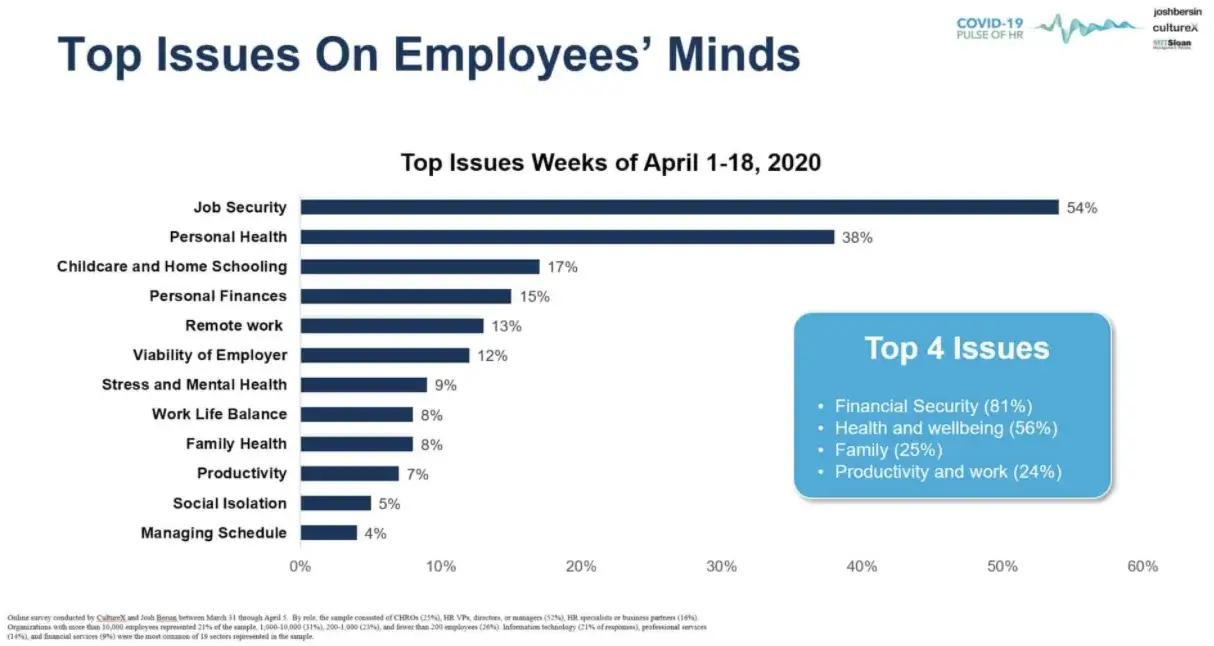
They found that the top issues employees have on their minds during the COVID-19 crisis include:
- Job security
- Personal health
- Childcare and home schooling
- Personal finances
- Remote work
- Visibility of their employer
- Stress and mental health
- Work life balance
- Family health
- Productivity
- Social isolation
- Managing schedule
As you can see, employees have may concerns and that’s where crisis management comes to place. Let’s see into more details how to build a solid crisis management plan to
16 Best Practices for Managing the COVID-19 Crisis
To protect your employees’ health and safety all while keeping your business running as smooth as possible, you’ll need to build a solid crisis management strategy.
The thing is, the coronavirus is not like any other crises your business has faced in the past.
We’ve listed below 16 crisis management tips to help you limit the impacts COVID-19 may have on your business and your employees’s health and wellbeing:
1. Create a coronavirus crisis management plan
In order to handle the coronavirus crisis properly, employers need to have a clear plan and strategy around it. Here are a few pieces of advice for developing an efficient plan.
- Ensure that the plan is flexible.
- Involve your employees in developing, managing and reviewing your plan.
- Frequently evaluate your plan to find out ahead of time whether the plan has gaps or issues that need to be fixed.
- Share the plan with the entire workplace and explain what human resources policies, workplace and leave flexibilities as well as pay and benefits will be available to them.
- Sharing is caring! Share best practices with other businesses in your communities to improve community response efforts.
2. Appoint a designated crisis management team
Not all companies have designated crisis management teams. Now is the time to form one! It is very important to appoint the right people who will be responsible for managing the situation in the workplace during coronavirus.
These people, before everything else, need to understand the seriousness of the situation and they need to be good communicators in order to keep the workplace aligned and safe.
3. Keep employees informed (with accurate and updated information)
Yes, coronavirus has shocked us all. It is scary, but the role of crisis management teams as well as internal communicators is to keep employees calm and try keeping stress levels at the very minimum.
This is why you need to communicate with your employees openly and frequently. Give them regular updates, tips and tricks on how to stay safe. Here is a short COVID-19 overview by the European Agency for Safety and Health at Work.
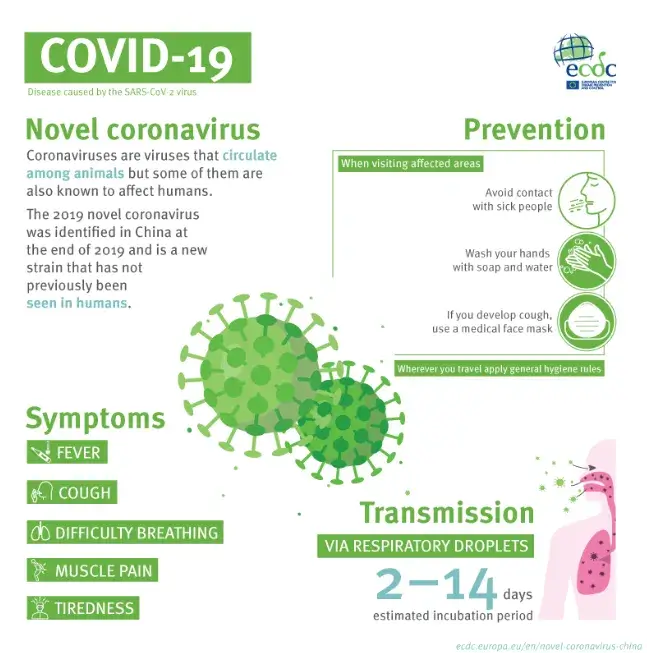
With Haiilo, you can automate content import from sources such as WHO and authorities monitoring the progress of the virus so you make sure that your employees stay safe during the coronavirus outbreak. Pretty cool, right?
📚Read on: Crisis Communication — How to Communicate Effectively with Your Employees
4. Give your employees useful advice and keep them connected
Even though most of you have already shared some of the most important COVID-19 tips with your employees, it doesn’t hurt to repeat the lesson.
Here is a short but useful infographic released by the Centers for Disease Control and Prevention.
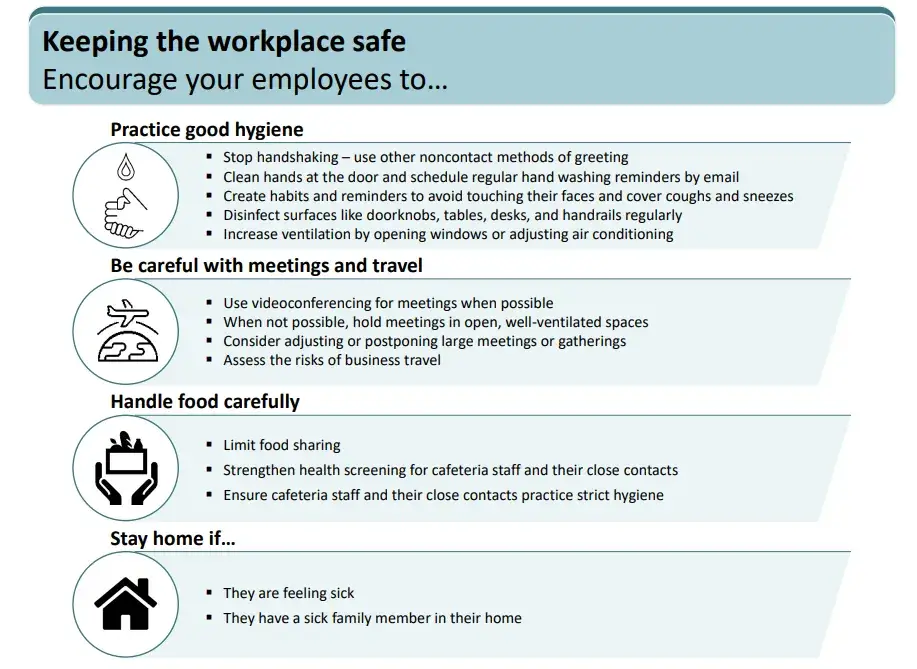
When sharing such information, it is very important to keep it relevant to employees’ positions, their geographic locations, and the nature of their work.
Haiilo enables employers to segment the employee audiences based on many different criteria which helps employers personalize their messages and make them more relevant to the target audiences.
If you want to make your messages more engaging, consider creating and sharing content such as videos, infographics and other interesting types of content.
5. Consider implementing remote work (if you haven’t implemented it already)
Another no-brainer. In order to stop the virus from spreading, people should be less mobile than they usually are, and they should certainly avoid contacts with too many people.
Luckily, remote work is common today, and it has become an option that most employers offer. However, not all businesses are requesting their employees to work from home.
For example, Manpower Minister Josephine Teo has declared in a recent interview that she estimates that only 40 per cent of workers in the Central Business District of Singapore currently work from home.

If your employees can do their work from home, then let them do so. That way, you are significantly reducing the chances for the virus to appear and spread within and outside your workplace.
📚Read on: Remote Work: 20 Ways to Engage and Connect with Your Remote Employees
6. Create an environment that fosters online collaboration
So, how to ensure that employees stay connected and collaborate efficiently while working from home?
Luckily, there are plenty of internal communication and collaboration tools that can enable employee success during the coronavirus outbreak. However, crisis management and internal communications teams need to make sure they foster this new way of collaboration.
They should continuously remind employees about the importance of being available online and staying in touch with their teammates via internal communications channels.
7. Answer all your employees’ questions
People are scared, and they naturally have plenty of questions around the coronavirus. Even though you may feel like there is no way to answer all your employees’ questions, there are simple ways to communicate the important information your employees need.
For example, you can create a “Coronavirus Q&A” channel on Haiilo where important information and tips around COVID-19 will be available to all employees at all times.
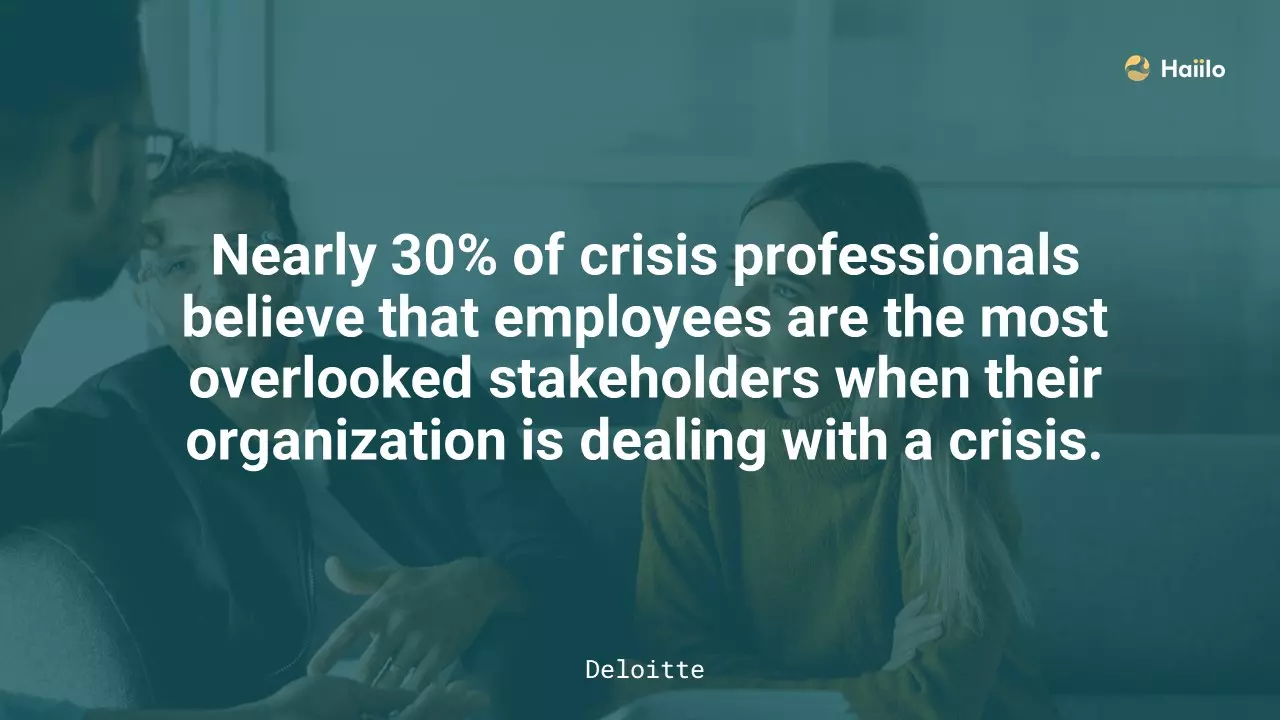
8. Stop the spread of misinformation in the workplace
Coronavirus is probably the most popular topic covered by the media right now and your employees talk about it every day. This is normal because the whole world is talking about it. However, there is also a lot of misinformation circling around it.
Besides providing accurate and updated information to employees, crisis management teams should also actively keep up with the news circulating on social media in order to spot and prevent misinformation.
As misinformation spreads quickly — especially on social media — employers have to prevent this from happening by monitoring and instantly sharing with the employees the latest updates being released by the WHO, Governments and other local authorities.
9. Use proper employee communications tools
Even though remote work may not be so new to your organization, the need for employee communications tools has just escalated.
The rapidly expanding impact of COVID-19 is rewarding companies that have prepared and have the needed applications, infrastructure, communication tools and policies in place. The payoff is a smoother transition during this period of crisis management.
The flow of information needs to be perfect during these times. For example, employers that use Haiilo can, for urgent messages that require immediate action, send automated emails and push notifications to employees’ mobile phones.
10. Define a central internal communication channel
As mentioned earlier, proper employee communication during coronavirus is very important, and the choice of the right communication channel is crucial.
The majority of today’s workplaces use multiple channels and tools to collaborate and communicate with employees. Document sharing tools, employee collaborations tools, emails… you name it!
Now, how to ensure that the important COVID-19 information doesn’t get buried and unnoticed?
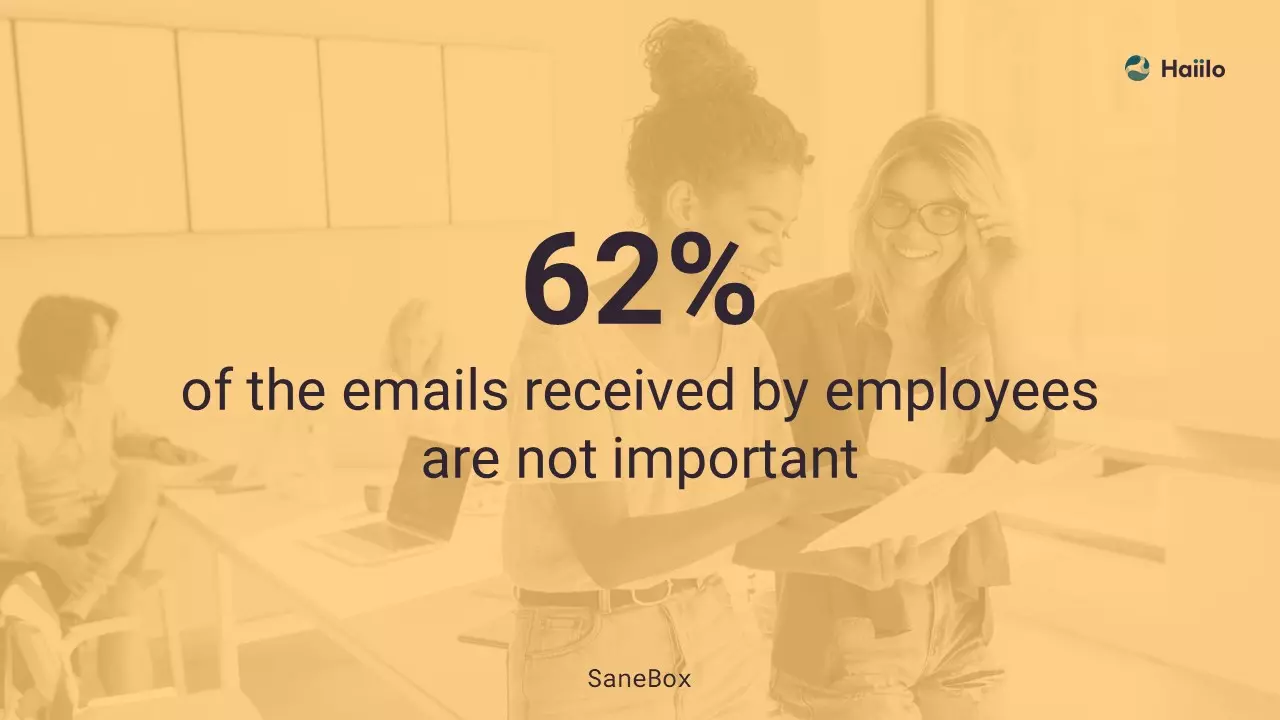
Implement a solution that connects all your internal comms tools and ensures that employees don’t have to search for the information they need.
11. Give special attention to your non-wired employees
What about retail and similar industries that have a lot of deskless workers? These employees often don’t have designated laptops or desktops so you need to ensure mobile communication with them.
This is why many employers are switching to Haiilo, our mobile-first employee communications solution that ensures proper information flow no matter what devices your employees use.
12. Update your corporate travel policy
If possible, try to encourage your employees not to travel during the COVID-19 outbreak. Otherwise, CDC advises employers and employees to regularly check the CDC’s Traveler’s Health Notices for the latest guidance and recommendations for each country to which employees may travel.
Specific travel information for travelers going to and returning from China, and information for aircrew, can be found at on the CDC website.
13. Perform routine environmental cleaning
Employers should routinely clean all frequently touched surfaces in the workplace, such as workstations, countertops, and doorknobs.
You can also provide disposable wipes so that commonly used surfaces (for example, doorknobs, keyboards, remote controls, desks) can be wiped down by employees before each use when they return to the office.
14. Update employees’ contact numbers and emergency contact details
Having updated employee information is important in case of an emergency. Even though this may seem like an easy task, reaching all your employees and getting needed information in a timely manner is not that easy to achieve.
Again, you should have a designated coronavirus channel for internal communication, and ensure that employees check it regularly.
15. Respect self-isolation guidelines and stay in touch with your self-isolated employees
Most of you probably know that employees with coronavirus should be cured and the ones that have traveled should stay in self-isolation and follow the local authorities’ guidance.
You, as an employers, should support and encourage those guidelines among employees and try to make sure that they respect them as much as possible.
Also, having these employees in mind and communicating with them regularly is important. Many of them may feel lonely and worried. Stay connected with them and show them that you are here for them.
16. Evaluate your coronavirus crisis management plan
This outbreak is a readiness test for many employers around the world. Yes, no one is happy about coronavirus, but can we learn something from it?
Organizations should evaluate the effectiveness of their crisis management efforts and identify opportunities for improvement.
- How well did you handle remote work?
- Did employees feel informed all the time?
- Did employees follow your advice?
- Were you fast enough in answering employees’ questions?
- Was the information you shared with your employees useful to them?
- Did employees actually read your updates?
- Were you able to control the spread of misinformation in the workplace?
Common Coronavirus Crisis Management Questions
There is a great article published by CNN on the most common questions related to the coronavirus employers and employees have been discussing so far now . Below are the questions, and here you can find all the answers.
- Should we avoid in-person meetings?
- If a colleague has symptoms, can I tell my boss I am not coming in?
- What happens when workers don’t get paid sick leave?
- What’s the best way for companies to control the spread of coronavirus at work?
- Can managers send a sick worker home?
- Should we avoid group lunches and after work drinks?
- Does taking public transportation to work put me at greater risk?
Is Your Crisis Management Team Ready for COVID-19?
Now that we went over some of the most important tips for protecting your workplace during the coronavirus outbreak, do you feel like you are on the right track?
- Do you feel like your crisis management teams are ready to handle the crisis?
- Are your employees well informed and ready to work from home?
- Have you updated your change management strategy?
📚Read on: Change Management: Definition, Best Practices & Examples
How Companies Use Haiilo to Improve Their COVID-19 Crisis Management
Employers across the world use Haiilo to keep their employees informed and engaged. Consequently, many of them have recognized the benefits of using Haiilo to better handle their coronavirus crisis management efforts.
Here is how they do so 👇
